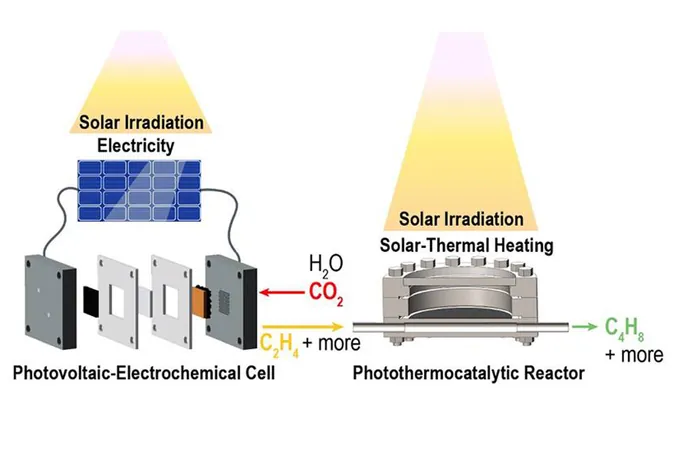
Harnessing Solar Power to Revolutionize Chemical Production
2025-01-13
Author: Michael
Harnessing Solar Power to Revolutionize Chemical Production
In an exciting breakthrough, scientists are demonstrating how the sun’s energy can be used to drive significant chemical transformations, paving the way for a cleaner, more sustainable future. A recent study highlights the development of a two-step process that converts carbon dioxide (CO2) — a major contributor to climate change — into valuable chemicals, specifically butene, using only sunlight as the energy source.
Published in the prestigious journal ACS Energy Letters, this research unveils a transformative approach to producing what is traditionally derived from fossil fuels. The conventional method of generating butene is not only energy-intensive but also results in considerable greenhouse gas emissions. The innovative process known as the Liquid Sunlight Alliance enables the direct conversion of CO2 to butene through a standalone system that operates without reliance on the electrical grid.
In essence, the scientists designed a two-step chemical cascade for the direct transformation of CO2 to butene. The first phase involves electrochemical reduction, utilizing a specialized gas diffusion electrode equipped with a copper-based catalyst. Here, simulated solar irradiation offers the necessary energy to convert CO2 into ethylene. What's remarkable is that this electricity harnesses power from an integrated solar photovoltaic system.
The journey doesn’t end with ethylene; in the second step, the outlet gas stream containing ethylene flows directly into a thermo-catalytic reactor, where it encounters a nickel-based catalyst. This reactor is uniquely powered by a selective solar absorber, which harnesses solar radiation directly to generate the heat required for the conversion process. This innovative technique not only saves energy but also eliminates complex separation processes between reaction steps.
This groundbreaking research highlights the immense potential of solar energy to facilitate direct chemical conversions into multicarbon products, which are essential for various industrial applications. Moreover, it opens up exciting avenues for further innovation in renewable energy-driven chemical transformations.
Looking ahead, the findings suggest that modular, solar-driven components could become instrumental in creating net-zero carbon fuels, chemicals, and materials. Such advancements can significantly displace reliance on carbon-intensive fossil fuels, aligning manufacturing practices with sustainable development goals.
As the world grapples with the impacts of climate change, this tandem solar fuel reaction methodology might be a pivotal player in the future of decentralized and sustainable chemical production, reinforcing the crucial role renewable energy can play in transforming our industrial landscape. Get ready to witness the dawn of a new era in chemical manufacturing — all powered by the sun!



 Brasil (PT)
Brasil (PT)
 Canada (EN)
Canada (EN)
 Chile (ES)
Chile (ES)
 Česko (CS)
Česko (CS)
 대한민국 (KO)
대한민국 (KO)
 España (ES)
España (ES)
 France (FR)
France (FR)
 Hong Kong (EN)
Hong Kong (EN)
 Italia (IT)
Italia (IT)
 日本 (JA)
日本 (JA)
 Magyarország (HU)
Magyarország (HU)
 Norge (NO)
Norge (NO)
 Polska (PL)
Polska (PL)
 Schweiz (DE)
Schweiz (DE)
 Singapore (EN)
Singapore (EN)
 Sverige (SV)
Sverige (SV)
 Suomi (FI)
Suomi (FI)
 Türkiye (TR)
Türkiye (TR)
 الإمارات العربية المتحدة (AR)
الإمارات العربية المتحدة (AR)